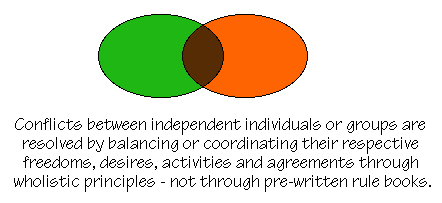
|
Other societies have had a dizzying number of rules and laws, usually completely incomprehensible as a whole, full of self-contradictions and exceptions. They seemed to be mostly an accumulative pile of compromises and short-sighted thinking, then acting as a neurotic social mind for the society, used as a basis for manipulation of populations and for self-serving interpretations.
As compared to that, what is presented here is the formulation of a few very simple, axiomatic principles or laws that can work as ground rules for any kind of society. They form a foundation for civilized co-existence and provide the means for arbitrating any dispute. These are fundamental social laws.
The premise here is that truth is inherently simple, and that a sane society doesn't need more than a handful of laws. Basic laws should be such that any person can understand them and remember them in their entirety without difficulty. They should have no exceptions.
- All manifestations of life are inherently interconnected and interdependent.
- Any person is free to leave circumstances they don't choose to participate in.
- No person is allowed to deliberately render common resources useless or unavailable.
- Strive to be tolerant of any experience.

|
It is not possible or desirable to have detailed rules about everything that people should do or everything that they shouldn't do. Life is most enjoyable as a spontaneous journey of discovery, pursuing one's own uniqueness, exploring different angles of life.
We can not judge the relative rightness or wrongness of actions simply based on what specific actions are done or based on the specific outcome. The whole situation as it is needs to be assessed, and the intentions of the parties involved need to be elicited.
Integrity and intent are probably the most important elements in a set of universal social rules. However, both integrity and intent are concepts that have been conspicuously absent from the practice of law in many societies. It has become common to apply law to get away with what one can, without regard to integrity.
Integrity could be said to be hard to define or vague or open to interpretation. However, that is in part the point. We can not put on a piece of paper specifically what action is a right one for everybody. We are all different and different actions will be right for each of us at different times.
We can set broad guidelines, broad but clear in their principles. The application to specific situations would have to be done by real live people dealing with the actual situation at hand.
Notice that several of the rules proposed here have a balancing effect in relation to each other, and that is of central importance. It does not mean that they contradict each other, it just means that several sides to a situation always exist, and they need to be aligned as best possible. A person is free to act the way he thinks is right. However, that right is limited by the requirement that he can not use his freedom to hinder the expression of that right for others, or to deliberately harm others.
Rules like those given above are likely to appear threatening to people who have been used to living as subjects of authoritarian, centrally controlled governments. Specifically, the lack of strict moral controls might seem scary to people who themselves have difficulty expressing themselves freely.
Reference: Domains
